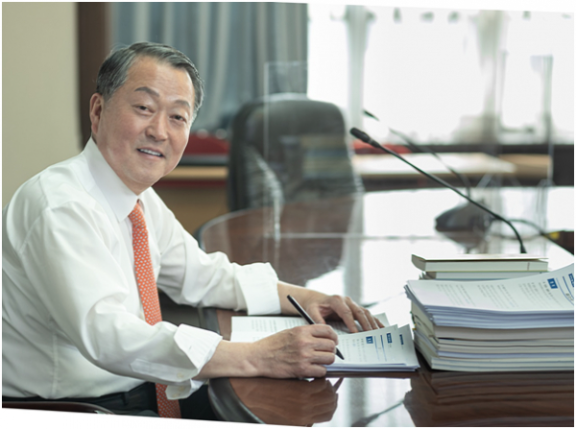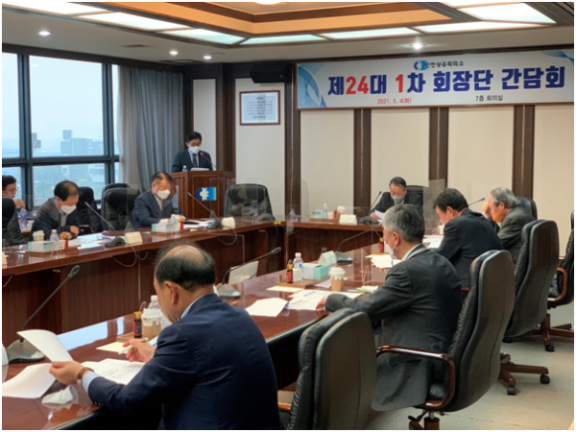Recovery of Incheon’s Economy Will Start from Incheon International Airport

Incheon Chamber of Commerce & Industry Chairman Shim Jae-sun
Today’s Incheon Chamber of Commerce & Industry was established on Nov. 25, 1930 after the establishment of its predecessor in July 1885. For as long as 136 years, the chamber has played a leading role in the development of the regional economy of Incheon. At present, its 24th chairman Shim Jae-sun is working closely with local business persons so that the central and local governments can better hear their voices. The following is a recent interview with him. — Ed.
COVID-19 has seriously affected the South Korean economy as a whole since last year. How is the regional economy doing?
The Korea Institute for Industrial Economics and Trade said in its recent report that Incheon is the second-most affected city in South Korea. This is because manufacturing and transport account for a large portion of Incheon’s economy. The supply-demand imbalance caused by the pandemic is still affecting manufacturers in the city, raw material prices and logistics costs have surged, and the capacity utilization of its industrial complexes is currently below the national average.
In the transport sector, the number of Incheon International Airport passengers has plunged by more than 90 percent since the outbreak of the pandemic and this has led to serious damage to a number of service businesses. According to the institute’s data, Incheon’s gross regional domestic product is recovering at the third-lowest rate in the country.
The country is about to enter the phase of coexistence with COVID-19. What effects are you anticipating?
I am convinced that the coexistence will lead to a regional economic recovery in that the impact of the pandemic has been so huge. Face-to-face services will be resumed at least in part, and then consumption will rebound to have a positive effect on the regional economy. In addition, the airport and related industries are expected to recover with the number of airport passengers rebounding.
Incheon, home to the airport and the Port of Incheon, is a global logistics hub. What are you planning on to further develop the logistics industry of the city?
The airport is definitely one of the finest in the world, and yet it had to face the impact of the pandemic like all the others. The chamber set up a citizen council this year so that the city’s economic rights regarding the airport can be expanded.
When it comes to the port, what is most important now is the designation of the hinterland area as a free economic zone. At present, the designation is being delayed and financial support from the central government is not enough, which has led to a delay in infrastructure construction and a decline in the competitiveness of the port.
What is your plan to help local companies enhance their competitiveness?
We have launched various online and offline projects so that their exports can be increased and they can find new markets. Next year, such projects will include online business support based on B2B and B2C e-commerce platforms, meetings with invited buyers, participation in international industrial exhibitions and logistics cost support for exporters.
In addition, the city has run a center since 2010 for better utilization of free trade agreements. It has provided professional education and consulting so that regional companies can find and enter new markets with greater ease.

A chair meeting at the Incheon Chamber of Commerce & Industry
What are the main difficulties of regional companies, and what is the chamber doing in order to help them?
COVID-19 is definitely the biggest challenge. Since the first day of the pandemic, the chamber has worked closely with the central and local governments to help them. In addition, it has held a series of meetings with the regional tax office.
Also, the city has held forums with CEOs, organized a chemical safety council and strengthened its environmental and safety risk control so that those companies can effectively respond to strengthening environmental and safety regulations. We are planning to hold information sessions soon regarding the Serious Accidents Punishment Act to become effective next year.
What are the chamber’s activities for job creation and employment quality improvement?
The chamber is running a human resources development committee to that end. With its programs, young people can be hired as learning employees who are trained while working or employees can be trained by external institutions based on the national competency standards.
We are conducting industry-specific demand surveys each year so companies and jobseekers can be connected better. We are also running subcommittees for Incheon’s strategic industries, including biotech, machinery, logistics and resort development, in order to share and discuss industrial issues and create more jobs.
Our programs also include digital trade expert training, from which a number of exporters in Incheon have benefited.
It has been about seven months since you took office. What is your promise for the rest of your tenure?
I am well aware of my responsibility as the head of the chamber in the middle of the prolonged COVID-19 pandemic. I will devote myself to regional economic development for the rest of my tenure.